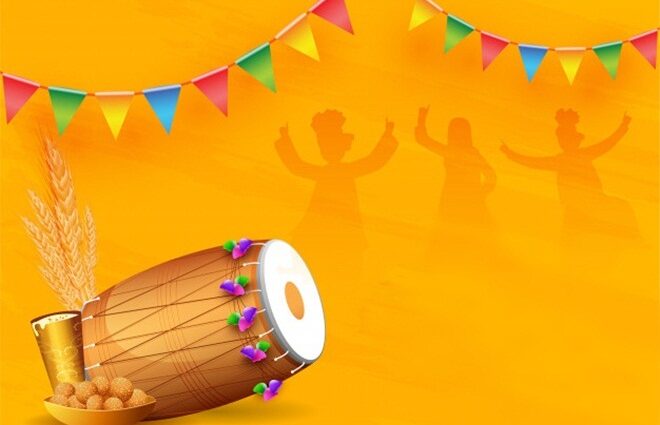Baisakhi or Vaisakhi, which is observed as a harvest festival in Northern India, marks the first day of the month of Vaisakh (usually celebrated on April 13 or 14) and the onset of the Hindu solar new year. Primarily dedicated to India’s agrarian community, particularly the farmers of Punjab and Haryana, the festival reminds
one and all of the importance of the farming community and their significant contributions to India’s economy, which is largely dependent on agriculture.
The enthusiastic shouts of ‘Jatta Aayee Baisakhi’ echoing through the bylanes of the hamlets and even urban areas of Punjab and Haryana lend flavor to the celebrations, which have both religious and patriotic significance. The festival is synonymous with cheerful bonfires, spirited bhangra and giddha performances to the accompaniment of the beats of the traditional ‘dhol’ and a sumptuous spread of Punjabi cuisine complemented by the traditional ‘lassi’.
However, there is more to Baisakhi celebrations in Punjab and Haryana than just this.
The festival is celebrated with immense fervor by both Hindus and Sikhs. This is evident from the élan with which temples and gurudwaras are decked up for the occasion. Yet, the celebrations have some traditions that are exclusive to each of the two religions.
Sikhism: Sikh devotees hold kirtans, besides paying obeisance at the Gurdwaras. Nagar Kirtans are also held to mark the occasion. Vaisakhi is also a time when Sikhs commemorate the…
Founding of the Khalsa Panth: Guru Gobind Singh, the tenth Sikh Guru, instituted the Khalsa Panth in 1699 on the occasion of Vaisakhi at Sri Anandpur Sahib, where he also chose his ‘Panj Pyare’ (five beloved ones).
Coronation of Maharaja Ranjit Singh: The celebration also coincides with the coronation of Ranjit Singh as the Maharaja of the Sikh Empire post his proclamation as the ruler on April 12, 1801. His enthronement was conducted by Sahib Singh Bedi, a descendant of Guru Nanak Dev.
Patriotic Commemoration
Jallianwala Bagh Massacre: Who can forget the horrendous bloodbath of 1919 that took place on Vaisakhi in Jallianwala Bagh, Amritsar, during the British rule, on the orders of General Reginald Dyer? Probably no
one, who has heard of it or read about it! The massacre shook the whole world, particularly the Sikh and Hindu communities of Punjab, who regard this site of British tyranny as hallowed ground. The Indian patriots had assembled at the Bagh to hold a peaceful protest against the arrest and deportation of national leaders Satyapal and Saifuddin Kitchlew, when Dyer entered the garden and ordered the troops to open fire at them. At least 379 people were killed in this massacre, while more than 1200 sustained injuries.
Hinduism
Hindu devotees observe the festival by performing acts of charity, besides taking a ritual dip in Ganga or other water bodies considered holy. Hindu pilgrimage sites witness additional fervor on this occasion on account of the community fairs held as a part of the Vaisakhi celebrations. Processions featuring statues of Hindu deities are also held at some places.
As per the Hindu beliefs, River Ganga, venerated as a goddess, descended on Earth on the day of Vaisakhi. A large fair is held at Haridwar, an important Hindu pilgrimage site, with lakhs of Hindu pilgrims thronging the Brahm Kund there to take a holy dip in Ganga.
Vaisakhi is also observed as New Year’s Day by Hindus in Assam, Bengal, Bihar, Himachal Pradesh, Haryana, Kerala, Odisha, Punjab, Tamil Nadu, Uttar Pradesh, Uttrakhand and other parts of India.
Hindu celebrations of Vaisakhi in Punjab: Katasraj, a Hindu shrine situated in Pakistan, used to be quite famous for its Vaisakhi celebrations in the pre-Partition era. In the present times, the Thakurdwara of Bhagwan Narainji at Pandori Mahatan village in Gurdaspur district of East Punjab is known for the most impressive Vaisakhi fair that spans three days from first to third Vaisakha.
Vaisakhi is also celebrated with immense zeal and fanfare in Jammu, Himachal Pradesh, Haryana and Uttar Pradesh. Coinciding with ‘Vishu’ and ‘Puthandu’ festivals of Kerala and Tamil Nadu, respectively, Vaisakhi is celebrated as Bohag (Rongali) Bihu in Assam and as Pohela Boishakh in Bengal, though almost a couple of days after the Vaisakhi celebrations.
The festival is also commemorated in Pakistan, Nepal, US and other countries abounding with the presence of Hindu and Sikh expatriates.
 The writer possesses a Master’s degree in Journalism and Mass Communication. She has worked with The Indian Express and Hindustan Times. She is currently working as a Public Relations Officer with one of the renowned schools in Amritsar.
The writer possesses a Master’s degree in Journalism and Mass Communication. She has worked with The Indian Express and Hindustan Times. She is currently working as a Public Relations Officer with one of the renowned schools in Amritsar.

